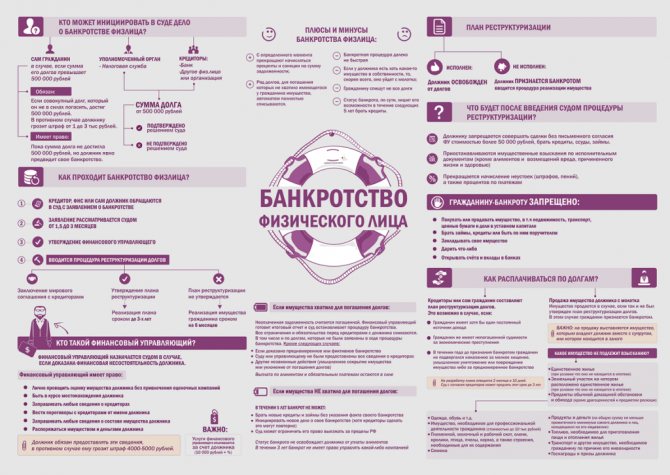What is the connection between bankruptcy and alimony write-off?
The insolvency of a citizen implies his insolvency to third parties. Based on the analysis of Law No. 127-FZ “On Insolvency (Bankruptcy)”, we can distinguish the following types of debts taken into account when determining the signs of insolvency:
- debts to creditors under contractual, credit and other obligations;
- debts on mandatory payments, taxes and fees;
- alimony payments to compensate for harm to the health and life of citizens;
- other types of overdue obligations
An application for bankruptcy must be filed if the period of delay exceeded 3 months, and the total amount of debt exceeded 500 thousand rubles.
If such signs are identified, the citizen is obliged to initiate bankruptcy proceedings himself. To do this, an application is submitted to the arbitration court. After the application is accepted and a bankruptcy case is opened, the execution of documents on forced collection and the accrual of penalties is suspended. After a citizen is declared bankrupt, debts will be completely or partially written off.
Alimony is collected by judicial acts or agreement of the parties, confirmed by executive documents. Withholding of alimony is the responsibility of not only the debtor, but also of third parties for whom he works or receives income.
After checking the grounds for filing the application and signs of insolvency, the arbitration court introduces debt restructuring. Its consequences apply to all types of debt, except for cases expressly provided by law. Law No. 127-FZ indicates that the general rule on restructuring does not apply to debt and current alimony payments. Consequently, even in the event of bankruptcy, alimony debts will not be written off, and the write-off of current payments will continue as a matter of priority.
Find out more Collection of alimony debt after 18 years
Is alimony written off for a wife or child in bankruptcy?
The main legal act that regulates the bankruptcy of individuals is No. 127-FZ “On Insolvency (Bankruptcy)”. He says that a citizen who does not have the opportunity to repay the debt in a timely manner and in full, provided that its amount exceeds 500 thousand, can declare himself insolvent.
N 229-FZ “On enforcement proceedings”.
There is a mention in No. 127-FZ of the specifics of collecting alimony debt during bankruptcy. The norms of the current legislation describe the bankruptcy of individuals; alimony in accordance with them is not written off and must be repaid first.
No. 127-FZ also states that after recognition of financial insolvency during restructuring or sale of property, the debt for alimony payments is repaid first. This means that recognition of the insolvency of the alimony provider will speed up their payment, including through the sale of property.
Bankruptcy and alimony penalties - how is this problem solved? Debt on alimony payments cannot be written off through financial insolvency. The legislator considers them as money belonging to the child, which should be used to support him and ensure a normal life. If payments are not made regularly, the debt will grow.
As for the order of repayment in bankruptcy, alimony debt is a priority. First of all, it is it that is extinguished, and only then the claims of creditors are satisfied.
Such legislative norms, on the one hand, protect the interests of children, but on the other hand, they carry certain risks. If the divorce occurred recently, there is a possibility that the divorce is fictitious. After the divorce, the spouse deliberately accumulates alimony debt, then initiates bankruptcy proceedings. His property is sold, but the proceeds are not used to pay off debts to creditors, but are used to pay off alimony. Thus, creditors receive nothing or the minimum, and thanks to a fictitious divorce, the family saves money.
If a decision has been made to carry out restructuring, then its plan should provide for regular contributions in favor of children. The alimony agreement in bankruptcy must be controlled by the bankruptcy trustee, as well as the transfer of money.
If a citizen does not have a permanent income and it is impossible to carry out restructuring, then a decision is made to seize the debtor’s property for sale and repayment of the debt. Real estate, equipment, cars and other valuables are subject to sale. They are sold through an auction, the proceeds are used to pay off arrears of alimony payments, and only after they are fully repaid are the creditors' claims satisfied. If the proceeds are not enough, the court issues a writ of execution for the balance of the debt to the claimant.
If the borrower does not have a constant income and property that can be sold to pay off the debt, then bankruptcy is carried out according to a simplified scheme. After this, all debts are written off, with the exception of arrears in payments to children, for which writs of execution are issued in order to collect alimony in the future.
The difficult financial situation of some citizens has caused the accumulation of significant amounts of debt. This applies not only to loans, but also to alimony. As a result, the amount grows quickly, and the debtor has to look for ways to get rid of this burden.
If we consider the bankruptcy procedure of an individual, then debts for alimony payments are practically not interconnected with it. Recognition of financial insolvency has practically no effect on them, so there is no point in hoping to get rid of accumulated alimony debt in this way.
You can also leave your feedback below in the comments or ask a question to a free bankruptcy lawyer or share the information with friends on social networks.
More on the topic Court order for the collection of alimony sample
In fact, personal bankruptcy and alimony are not interrelated concepts, as many people think, especially when it comes to alimony.
Is alimony written off in the event of bankruptcy of individuals? No, these debts, unlike debts on credits, loans, taxes, as well as debts related to damage caused to a third party, are not written off by law.
This is an exception to the rule. Paying child support is the parent’s responsibility to ensure a normal life for the child he left behind.
In addition to the fact that alimony debts are not written off, they also accumulate, and in full. In 2020, the law does not provide for a reduction in the percentage of payments in the event of bankruptcy of an individual alimony payer.
By the way, declaring yourself bankrupt is not so easy. In order for the court to issue an appropriate ruling, an individual must have a debt of more than 500 thousand rubles, and the period of non-payment of obligations must exceed 3 months.
In addition, the person must confirm that he does not have movable or immovable property.
Often alimony payers who have a business resort to a trick: they declare themselves bankrupt, albeit fictitiously. They transfer their property to dummies, hide it, transfer it, give it away.
But such an attempt to deceive the state will not be successful, because any government entity has the right to submit a request to the tax or other government bodies in order to find out where the money and property of the alimony payer were transferred.
Often, after a divorce, even wealthy people do not give money to their ex-wives for the maintenance of their common children, thereby placing all responsibility for their upbringing and financial support on one parent. Moreover, they are trying to hide the actual amount of wages and remove property from their property in order to avoid legal consequences such as arrest or sale.
Enforcement proceedings are not the only way to collect alimony from such defaulters. An effective way is to file for bankruptcy of the alimony provider. At the same time, former spouses can also initiate insolvency proceedings. The plaintiff has the right to demand the return of, in addition to the main alimony debt, also the collection of a penalty for late payments.
Alimony is collected from the date of filing the relevant application. There is no statute of limitations for alimony. The resolution of the Supreme Court of the Russian Federation clarifies the controversial issue in the legislation regarding the start of calculating alimony in cases where it is necessary to recognize paternity. The Supreme Court, in particular, ruled that in such situations, the calculation of alimony begins from the date the citizen is recognized as the father.
In order to collect alimony from the debtor, one of the procedures is introduced during the bankruptcy process - debt restructuring or sale of property.
- Debt restructuring is associated with the revision of the terms of payment of debts on existing monetary obligations. We are talking about reducing interest on loans, increasing the repayment period of debts, but not more than three years. “Judicial practice has demonstrated the inconsistency of this procedure. As a rule, creditors cannot reach an agreement with the debtor. And in case of bankruptcy of an individual, alimony is accrued to the wife during the procedure. Therefore, one cannot count on the fact that a debtor who is late in paying alimony cannot be counted on,” noted the head of the National Central Bank, Dmitry Tokarev.
- If there is arrears of alimony, then in case of bankruptcy it is more advisable to immediately enter into the sale of property. The procedure involves the sale of the debtor's property in order to satisfy the claims of creditors. According to the law on bankruptcy of individuals, the only home of an insolvent citizen is not subject to sale. During the procedure, the manager will check the property and transactions made by the debtor over the past three years. “If the interests of the plaintiff in a bankruptcy case are represented by professionals, they will identify questionable transactions and challenge them in court. This is done to include the fraudulently obtained property in the bankruptcy estate,” explained the head of the National Bankruptcy Center Dmitry Tokarev.
In what order are alimony claims satisfied in bankruptcy? This question is also one of the most frequently asked questions in consultations with clients who want to bankrupt an unscrupulous payer. If there is arrears of alimony, then in the event of bankruptcy, the proceeds from the sale of the debtor's property are primarily used to pay it off.
Depending on the time of occurrence of obligations, alimony in case of bankruptcy of individuals is considered as registered and current. If the debtor has sufficient income, he further undertakes to support minor children or disabled parents. This means that during the procedure, alimony must be paid to the bankrupt citizen.
| Video (click to play). |
Each case is individual. To study all the details and develop the optimal action plan, it is better to contact specialists. NCB lawyers will provide free advice on any issue of interest. Call and make an appointment for a personal appointment!
Alimony is the provision of financial assistance for the maintenance of minor children and disabled close relatives. Despite the fact that the assignment of bankrupt status to an individual is the moment the existing debt is terminated, the procedure for collecting and paying alimony does not undergo any changes.
Confirmation and write-off of alimony in bankruptcy
When considering a bankruptcy case, current payments and arrears of alimony for a child, wife or other disabled family members will be taken into account. For write-off purposes, all alimony obligations are divided into:
- periodic payments collected before the bankruptcy case was filed;
- alimony collected after filing for bankruptcy;
- alimony debt incurred at the time of filing for bankruptcy.
Current alimony payments in case of bankruptcy of individuals are paid on a general basis. Law No. 127-FZ provides that alimony is included primarily in current payments at all stages of bankruptcy. Therefore, alimony must be paid as a matter of priority even when bankruptcy proceedings are initiated.
After the initiation of the case, the management of the property and control over the debts of the debtor is carried out by the manager. It is he who is entrusted with the responsibility to monitor compliance with the sequence of current payments. If there is a violation of the order of current payments, including alimony, responsibility rests with the manager.
In addition to the manager, control over current alimony payments can be exercised by the collector and the bailiff. To calculate alimony in bankruptcy, the general rules of Law No. 127-FZ, the Family Code of the Russian Federation and Law No. 229-FZ apply:
- the deduction takes place in the amount specified in the executive document (for example, as a percentage or a fixed amount);
- withholding applies to all types of income of the debtor, except for cases expressly specified in the Code of Civil Procedure of the Russian Federation and Law No. 229-FZ;
- withholding is carried out after withholding the debtor's income tax (13%).
Thus, even the introduction of restrictive measures against the debtor will not infringe on the rights of the recipient or claimant of alimony.

○ Advice from a lawyer:
✔ The alimony provider was declared bankrupt, after which he flatly refuses to pay alimony and pay the debt. Is this legal and can he be forced to pay?
Refusal to pay alimony is unlawful, which is regulated by Article 213.27 of the Bankruptcy Law. If you cannot resolve the matter peacefully, you can go to court.
✔ Can a property division agreement be canceled if bankruptcy is declared after one and a half years from the date of divorce?
If the agreement is properly drafted and properly registered, the bankruptcy of one spouse cannot affect the property of the other.
Specialist Roman Belov will talk about paying alimony to an officially unemployed father.
Published by: Vadim Kalyuzhny , specialist of the TopYurist.RU portal
Since October 2020, citizens have the right to declare their insolvency; Chapter 10 of Law No. 127-FZ of the Russian Federation came into force. The procedure she established is complex and full of nuances. One of them is alimony. Let's consider the procedure for collecting amounts for child support from a bankrupt debtor, how to protect the rights of a child during bankruptcy, and dwell on the peculiarities of law enforcement practice in relation to an agreement on the payment of alimony.
Write-off of alimony debts in bankruptcy
In relation to alimony debts recorded at the time of filing the application to arbitration, the law provides for a special enforcement procedure. Although enforcement proceedings for most of the debtor's obligations are suspended, nothing changes regarding alimony. This means that deduction for alimony debts will be carried out as before.
Find out more How to apply for 10,000 for a child under 16 years old
Debt in alimony payments, confirmed by materials of enforcement proceedings, is subject to inclusion in the register of creditors on a general basis. Such debts are included in the priority list of creditors first and are subject to priority execution when selling property at auction.
The size of alimony debts in bankruptcy does not matter. Even if the entire amount from the sale of property goes to repay first-priority debts, other creditors will not be able to raise objections or challenge such actions of the manager.
Write-off of alimony after a citizen's bankruptcy
After the court makes a decision to declare a citizen bankrupt, most of his debts to creditors will be written off. This rule does not apply to alimony debt. Even if claims for alimony debts were not made in the bankruptcy case, this does not deprive the claimant of the right to make such a request later. The collection procedure in this case corresponds to the usual rules.
If, after the sale of the debtor’s property, the alimony debt was partially repaid, the claimant will be able to present the remaining balance for execution at any time. The procedure for presenting debts for collection will be carried out:
- independently as a collector at the debtor’s place of work;
- by FSSP specialists within the framework of enforcement proceedings.
Regardless of the size of the citizen’s total debt or the consequences of bankruptcy, the rights and legitimate interests of the recipient will not be infringed.








